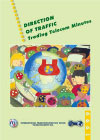
Summary
|
6. Transit Charges
The service of transit involves the delivery of telecommunications traffic from one country to another via a third country. Transit is unavoidable for some developing countries because of their geographical situation. Larger, operators are increasingly offering transit as a competitive service, a practice often called hubbing. Some operators also offer to terminate and reoriginate a particular call—a service known as refile—in order to exploit arbitrage opportunities in the price of two indirect calls compared with one direct one.
For many countries, transit traffic represents a major portion of their total traffic. For instance, Lesotho’s transit payments are so high that the country maintains a settlement payment deficit with the rest of the world. No carrier voluntarily publishes transit charges and only one regulator, OFTEL in the United Kingdom, requires publication, and even this obligation is restricted to a few markets where one or more companies hold a dominant position. A transit carrier will typically agree one rate for a traffic stream with both origin and destination countries (the published rate) but actually charge a different, lower rate (the confidential rate) to the origin country. The lack of transparency means that competition is frequently not effective in reducing prices. Using data on transit revenues raised by US companies, it is possible to estimate that the average price for transit was some 17 US cents per minute in 1997 and above 30 US cents in Africa. These rates are actually higher than the FCC’s Benchmarks for settlement rates in many parts of the world.
In discussions over transit, the positions adopted by operators of the developed North and the developing South are often the reverse of the positions adopted over settlement rates. For instance, countries of the North which are net exporters of telephone traffic have adopted a position of wanting to see settlement rates reduced towards costs, in a transparent, non-discriminatory and
cost-oriented environment. In the case of transit relations, it is the countries of the South which are pushing for lower rates, and the operators of the North which are resisting the call.
The Focus Group has proposed an upper limit on transit charges of 6.7 US cents per minute to be achieved by year end 2000 in relations where the operator lacks a choice of transit service provider. If implemented, this would bring substantial benefits to small and land-locked economies. The FCC’s Benchmark Order is curiously silent on the topic of transit, perhaps reflecting the fact that US carriers are among the major providers of the service. |
For many countries, transit traffic represents a major portion of their total traffic
The focus Group has proposed an upper limit on transit charges of 6.7 US cents per minute to be achieved by year end 2000 |



